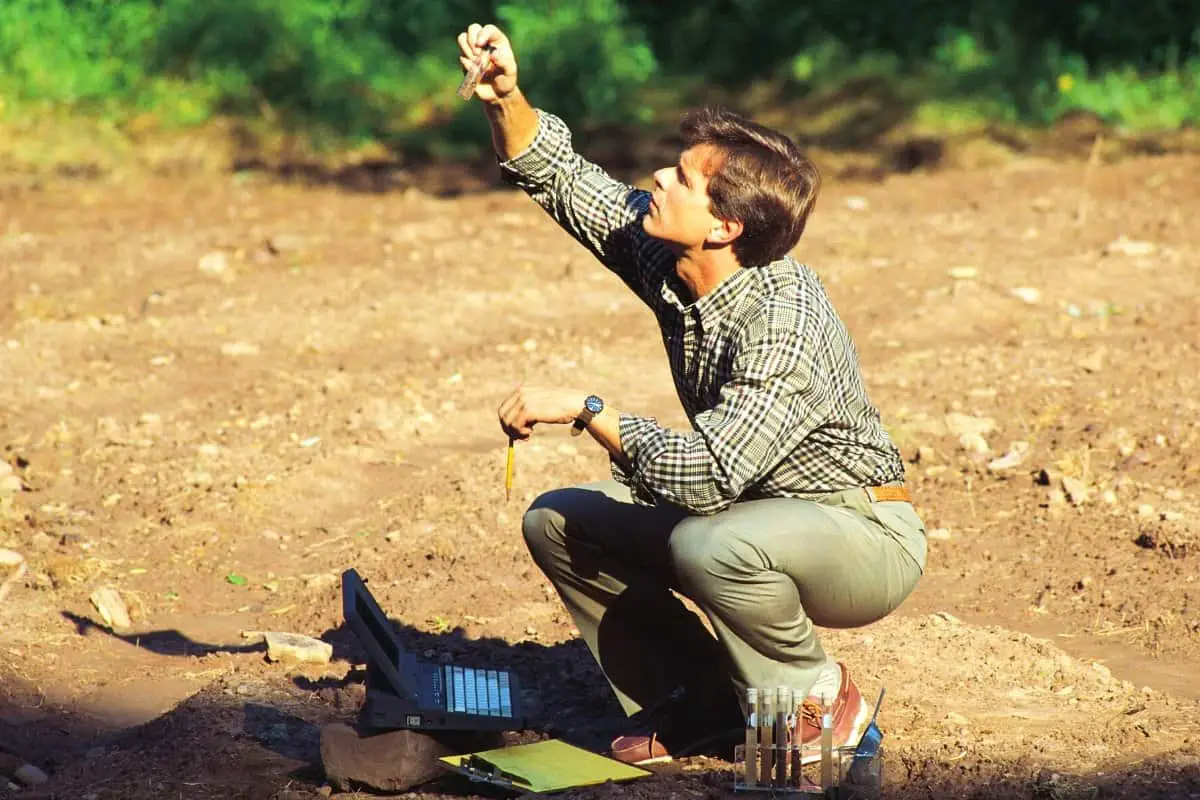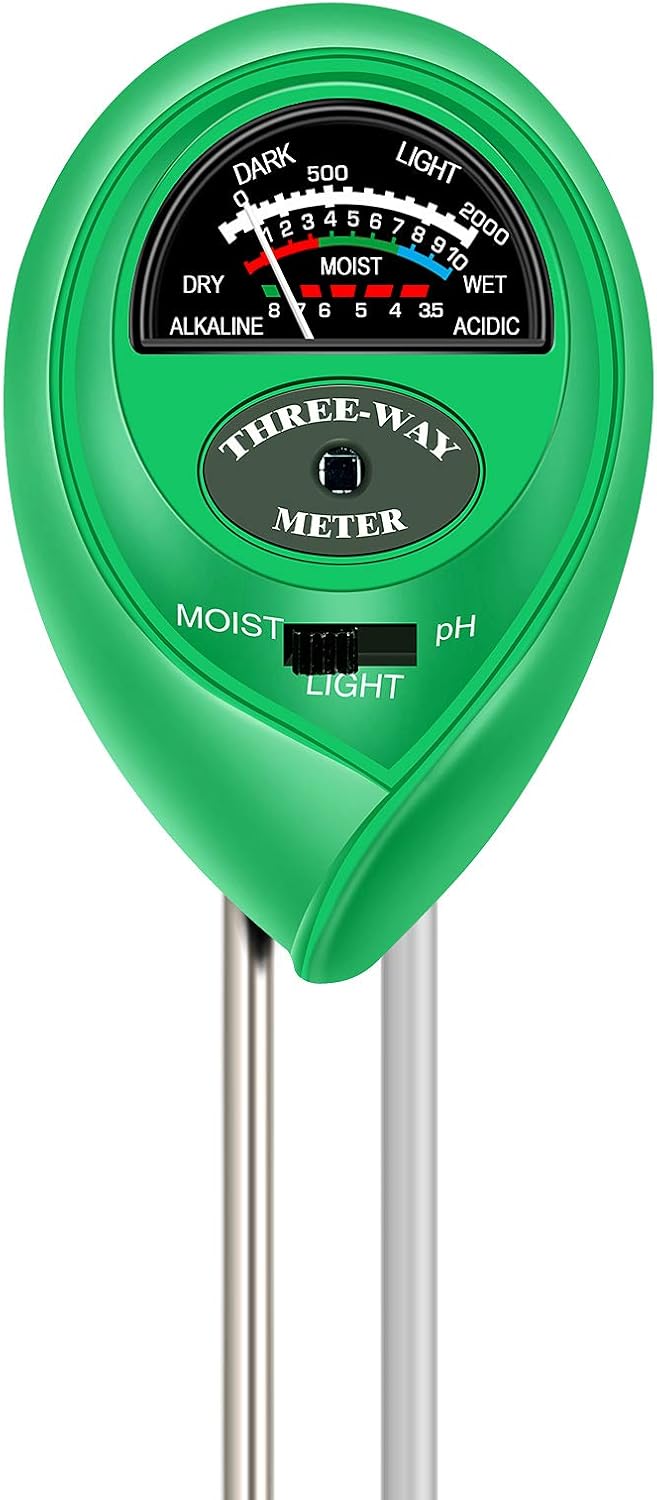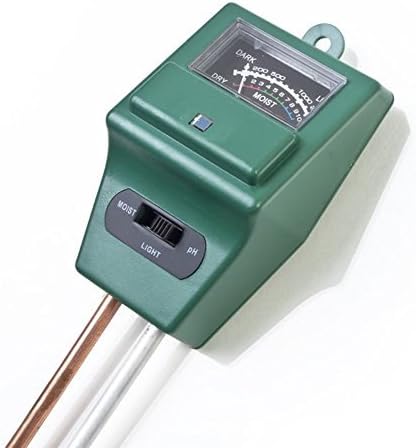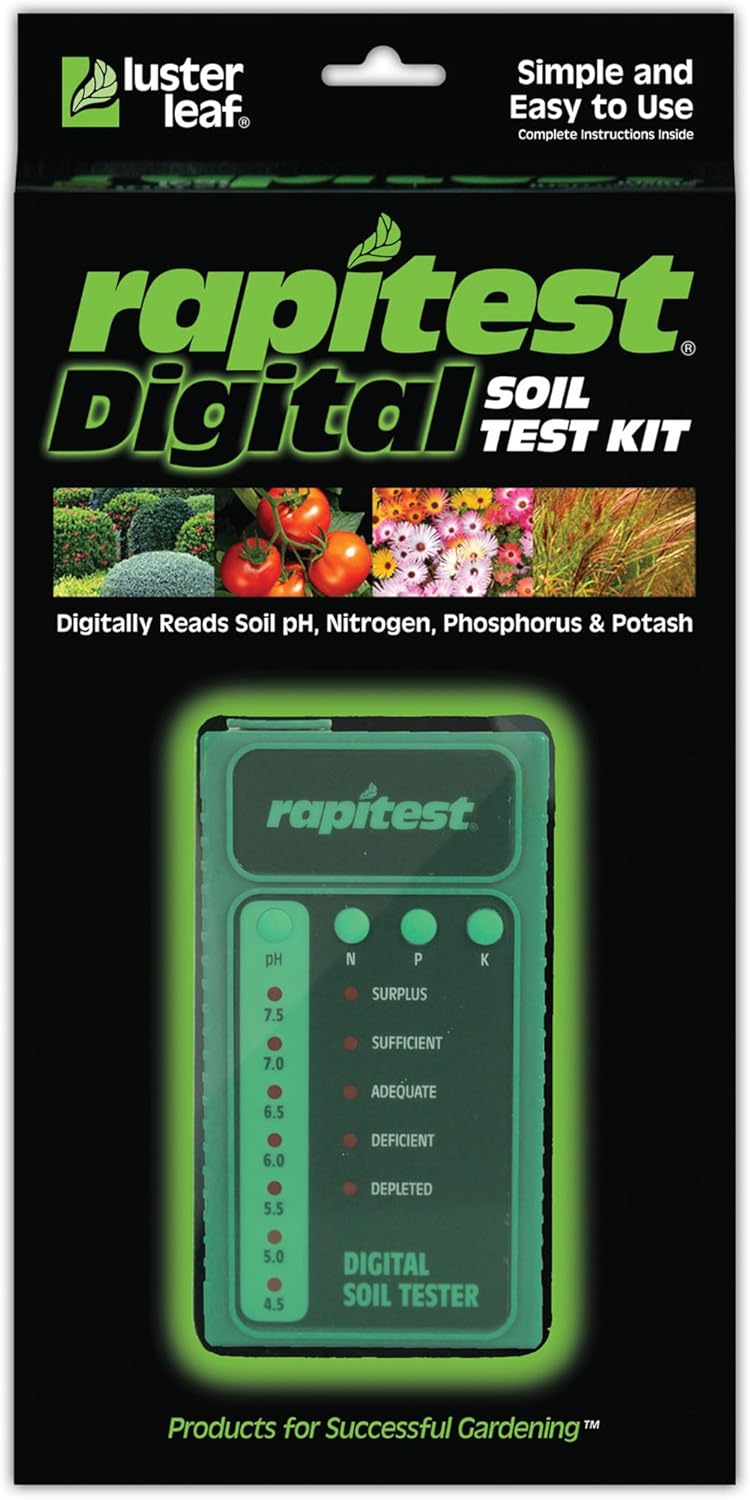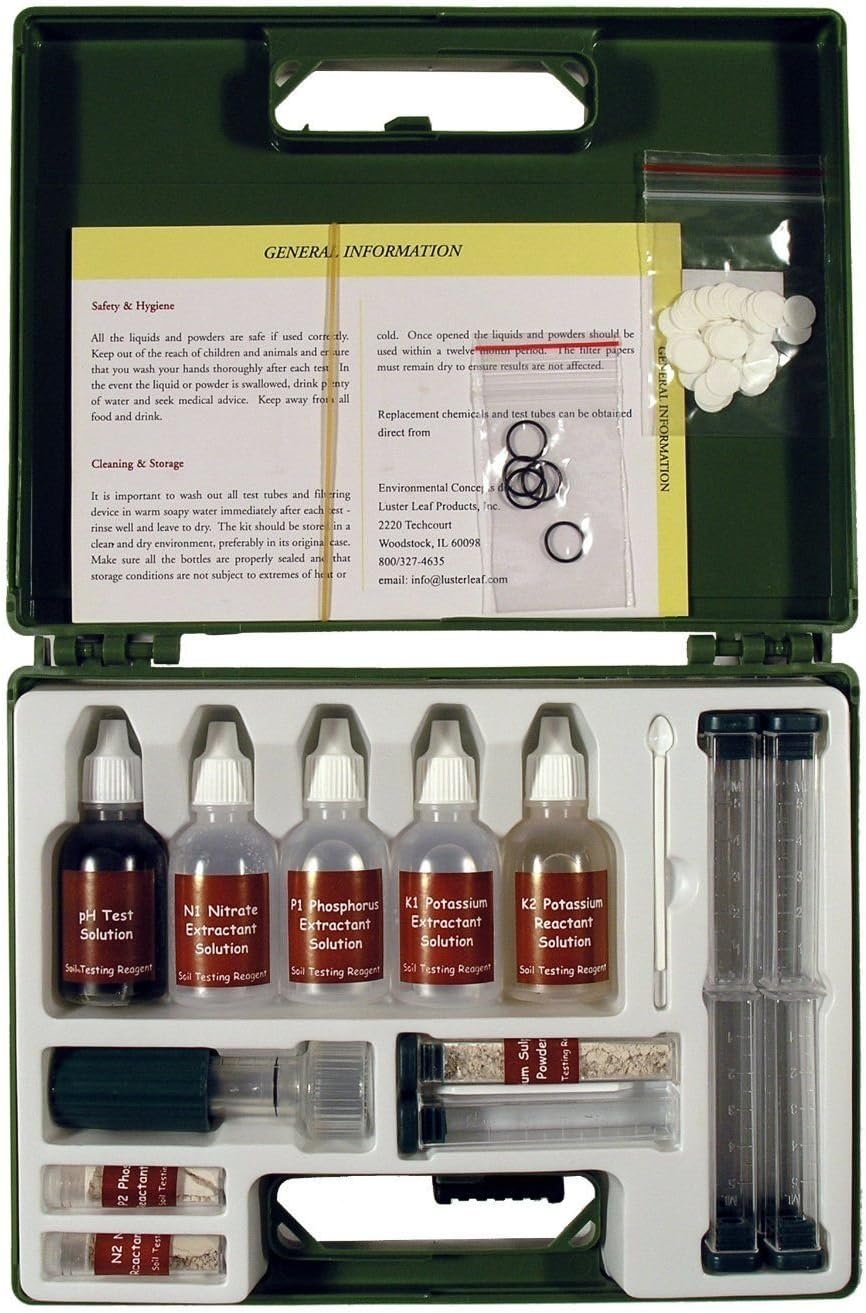Last Updated on December 30, 2021 by
As a gardener, knowing the importance of using the best soil test kit to test your soil is paramount to getting good gardening results.
Most gardeners know what their plants need to thrive, but most do not know how to test for those needs. Testing the soil is the ideal way to know the nutrients needed in your soil for better plant growth.
There are so many test types available, how do you choose the best? There are chemical, digital, and professional tests that you can choose from.
What is a Soil Test Kit?
A soil test kit is a gardening tool used to test the soil’s health. The most common tester is the pH tester that informs you on the level of acidic and basic properties of the soil.
Another soil test tells of the different components of the soil. The test allows you to see substances like Potassium, Nitrogen, and other elements. This information lets you know what to add to your soil to perfect it.
The final soil test is used to measure the moisture of the content of the soil. This test is important to use to determine the specific levels of water in the soil.
What Advantages Do You Get from Using a Soil Test Kit?
So why is it important to test your soil?
- Perfect the Soil. When you understand what your soil is lacking you can add it to perfection. With perfect soil, your plants will thrive and produce larger quantities.
- Shows the True Condition of the Soil. Healthy soil has 3 important components – Potassium, Nitrogen, and Phosphorous. Testing it shows you the exact condition and what components to add or reduce.
- Determine the Soil Needs. Using the soil test kits allows you a rare chance to know exactly what your soil needs. If it is too dry, water it, if lacking nutrients, add the right amount. It takes a lot of guesswork out of your gardening journey and saves you resources and time.
Best Soil Test Kit to Choose from
ATREE Soil 3 in 1 soil tester kit
ATREE is an analog unit that is 3 in 1. It comes in three different testing abilities. ATREE measures the soil moisture, pH level, and light requirements. It is precise in its functions giving you accurate readings.
This is an excellent basic unit for checking the pH level of the soil at regular intervals. The sunlight sensor is positioned on the front center of the device. The design makes it easy to read with a simple panel on top of the device. it uses a needle to point to a different amount of each substance. It is easy to switch between different capabilities by flipping the switch itself.
It is easy to use for every gardener including newbies. Insert the probe into the soil and wait for it to read. It is useful in both outdoor and indoor gardening.
Pros
- Comes with 3 testing capabilities
- Very simple to read
- Easy to switch between tests
Cons
- This item is not strong enough to use on hard soils.
- It is not durable
- It does not hold together securely
3 in 1 Soil Moisture Meter
This 3 in 1 soil moisture meter is analog. It tests for soil moisture, pH value, and light. made from an old design, it is quite affordable compared to other soil test kits. It gives you reasonable results with a sign of your soil’s acidity or alkalinity.
This device excels more at soil moisture indication more than the other tests. The soil moisture test ensures your soil maintains the right wetness levels – not too dry or too wet. This test kit takes about 15 to 20 minutes to reach its accurate range.
Pros
- It is affordable compared to other brands
Cons
- Might not give accurate results
- Takes longer to display the results
- It’s an old design
WHITETAIL Institute Laboratory Soil Test Kit
WHITETAIL is a professional commercial lab test kit. It includes everything you need for an accurate soil analysis. It is very easy to use; collect a soil sample and send it in to get a break down of the results.
After you buy the kit, you will have to mail your soil samples to the institute to get them tested and broken down. The results are thorough and worth having! They are available within a week and you can choose to receive them via email or postal mail. The results are detailed! They identify how much calcium, phosphorous, magnesium, and potassium available in the soil. It also tells you the pH level and how much organic material is present.
Pros
- The soil test kit offers a professional analysis
- You get professional consultations via telephone included with the purchase
- Offers inclusive results that you need to improve growth and quality
Cons
- It takes time to get the results
LUSTER LEAF 1601 Rapitest soil test kit
LUSTER LEAF is a chemical kit that is available for use. It is easy to use and gives results fast. Put a small sample of soil into the tube on the side of the box, add some distilled water, reagent capsule and shake it up. Allow it to sit until the color has fully developed and match it against the color chart.
This 1601 brand offers an attached color chart that other kits lack. The color chart is well attached to the test ensuring you don’t lose it. You receive 4 color-coded boxes that represent different tubes. Each box handles one of four tests N, P, K, or pH.
The results are not as accurate or detailed as professional testing. But they offer baseline reading which is a great option.
Pros
- You test more components faster
- The containers/boxes help you stay organized
Cons
- Test capsules run out fast and refilling costs more money
- The testing process is difficult to follow
LUSTER LEAF 1880 Rapitest Digital Plus
This LUSTER LEAF brand is a digital soil test kit that tests for soil pH. It does not test for micronutrients or macronutrients; rather it tests for pH – critical to the soil. It is simple to use, take your clean probe and insert it at the base of your plant into the deep soil. Wait until the screen shows the pH level once it completes the test.
It offers a database of popular plants and their required pH levels built in to help you optimize each plant.
Pros
- Easy to use and read results
- Measures the pH level and give instant results
- Includes a built-in electronic plant database
Cons
- Only carries out one test the pH only
LUSTER LEAF 1847 Rapidtest Digital Plus
The 1847 test kit is a digital one testing for the soil pH. Without a balanced pH value, your plants will not thrive. This kit tests the pH at the plant root level. It is easy to use and requires no expertise. Simply take the clean probe and insert it at the base of your plant into the deep soil. Wait for the screen to show your results once the testing is complete.
This kit gives you more information on the required pH values for popular plants helping you optimize each plant.
Pros
- Easy to read the digital kit
- Measures the pH instantly
- Comes with a built-in plant database
Cons
- Tests only for the pH value
LUSTER LEAF 1605 Rapidtest digital soil test kit
The 160s kit is a chemical/ digital hybrid tester. It combines the digital reader of pH testing with the chemical NPK macronutrient testing. For people who don’t know how to read the difficult chemical kits, you can use the digital reader.
This kit is a fast home option that is easy to use and gives results fast. For your digital reader to function properly, keep it as clean as possible.
This is a great choice for new gardeners who do not know much about the technicalities of the soil test kits.
Pros
- Has a push-button for easy testing
- Provides results within a few minutes
- Reads test colors utilizing advanced LED digital features
Cons
- Test lids can fall off easily
- Test capsules can be tricky to open
RAPITEST Premium soil test kit 1663
RAPITEST premium kit is a chemical test kit that allows a possible 80 tests. It measures the N, P, K, and pH of the soil. This kit has a step by step guide on how to perform these tests. It requires a little patience to get the results once you take the tests.
The kit comes in a sturdy plastic carrying case. It comes with refills available for the different test agents. It is the best test kit in the chemical kits department.
Pros
- Includes 80 tests in all
- It not only measures the pH but also Nitrogen, Potash, and Potassium
- Provides accurate results
Cons
- The testing process is a bit complicated
Conclusion
Using a soil test kit is one of the easiest ways to remove the guesswork of gardening. Most people shy away from gardening thinking it is difficult. Yes, it is tough to determine the specific needs of your plants especially if they are failing.
However, meeting the soil needs solves half of your gardening problems. Healthy soil will definitely produce healthy plants. It’s up to you to figure out what quantity you need to adjust in your soil for healthy gardening.
FAQs
Are soil test kits worth it?
Soil test kits are available for home use or for professional use. With soil test kits, you can find out what kind of soil you have in your garden so that you may then make the necessary adjustments accordingly.
Soil test kits are not a replacement for professional soil analysis. They are just a rough measure to judge if there is enough water and nutrients in the earth to grow plants successfully.
Soil testing kits are becoming more and more popular in the gardening community, as they claim to provide detailed information about the health of your soil, which can help you maintain a healthy garden. They can be pricey though, but it is worth investing in if you want to grow healthy plants that don't need fertilizers.
It's never too late to start taking care of your soil. There are a lot of benefits when it comes to starting a soil garden - it helps eliminate runoff and pollution, save water, and increase nutrient retention in the soil.
Which soil pH tester is best?
Soil pH is an important indicator of the soil’s fertility. It can be tested by using a soil pH tester. They can be classified as qualitative or quantitative based on their accuracy and the items that they test for. The qualitative ones are more accurate but only test for pH levels, while the quantitative ones are less accurate but cover all five nutrients in soil.
The best soil pH tester overall is the Soil Habitat Garden Soil Test Kit by Precision Hydroponics because it tests all five nutrients in one kit and provides accurate readings at a lower cost than other models.
Soil pH is a measure of the hydrogen ion concentration in soil. It helps grow plants, but it can also indicate how acidic or alkaline the soil is. The pH of most soils typically falls between 6 and 7.
Can you test your own soil at home?
Yes, you can! You can test your soil at home using a soil moisture meter to determine the water status of your soil. Read on to find out how.
Soil moisture meters are compact instruments that measure the amount of water in your soil. They are also easy to use and come with a calibration kit that you need only once. It is important to note that what this meter will tell you is the relative quantity of water in your soil, not the total quantity of water in your garden or farm.
Water content is an important factor in determining whether plants will survive or not. Water content is used by most standard hydroponic systems and hydroponic farms as one of the main factors for crop productivity.
How can I test my soil for toxins?
The simplest and most affordable way to test your soil for toxins is by using a kit from a lab. You can use these kits in the field or in the lab. The kit will reveal the level of toxins and provide you with instructions on how to take care of your soil.
The first step is to break up the area that you want to test, then add some sample soil into a clear jar that has been labeled with your name and address. In order to speed up the process, it is recommended that you put some seeds in another jar and cover it with an equally sized jar lid so they don't dry out.
In order for this process to work correctly, you must keep the area cool and moist at all times. In addition, it's important not to dig deeper than one foot
Caroline is a gardener who loves to get down to the nitty–gritty of gardening. She proudly proclaims herself as a ‘dirt worshipper‘ and can often be found deep in the garden, covered in soil and singing to her plants. As a self–proclaimed ‘plant whisperer‘, Caroline believes that plants need love and attention just like any other living thing, and she loves to give them both. When she‘s not tending to her garden, you can often find her researching the latest gardening trends, or teaching others how to make their gardens thrive

